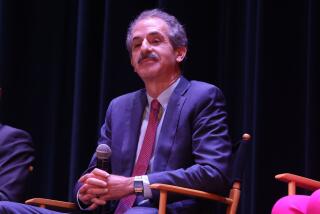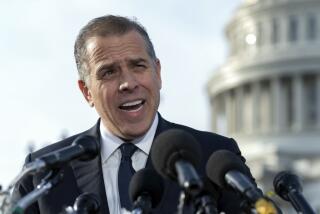2nd White House Steward Appears Before Grand Jury
A White House steward with access to areas around the Oval Office appeared Thursday before the federal grand jury investigating President Clinton’s relationship with a former intern.
The witness, Glen A. Maes, 40, is the second White House steward prosecutors have summoned before the grand jury. Maes made no statement to reporters.
The staff of independent counsel Kenneth W. Starr is seeking information from any White House aides who may have observed Clinton in the company of the former intern, Monica S. Lewinsky.
Starr is investigating whether the president has testified falsely or otherwise sought to illegally cover up the nature of his dealings with Lewinsky or another former White House aide, Kathleen E. Willey.
Both Maes and the other steward who has testified, Bayani B. Nelvis, are represented by the same Washington lawyer, Joseph T. Small Jr. On Nelvis’ behalf, Small is participating in a “joint-defense” arrangement with Clinton’s lawyers, under which they discuss the information sought and obtained from them by Starr’s office.
Starr, meanwhile, has tried without success to call Secret Service agents who, like the stewards, have wide access in the executive mansion. The Secret Service has been represented by Justice Department officials, who contend that allowing prosecutors to question the agents about their observations would undermine the service’s role in protecting the president. If a president fears that his protectors could be witnesses against him, the Justice officials have said, the chief executive might be inclined to try to avoid them.
In a development related to another aspect of Starr’s investigation, Deputy Atty. Gen. Eric H. Holder Jr. called on Starr to examine allegations that David Hale, a witness in the Whitewater controversy, “received cash and other gratuities from individuals seeking to discredit the president during a period when Hale was actively cooperating” with his investigation.
If true, Holder wrote in a letter to Starr, the conduct could amount to “criminal witness-tampering.”
The Associated Press has reported that from 1994 to 1996, when Hale was convicted of fraud and began cooperating with Starr’s office, he often used a fishing cabin in Hot Springs, Ark., rent-free. The cabin was owned by bait shop operator Parker Dozhier, who has acknowledged receiving $35,000 to be the “eyes and ears” in Arkansas for the American Spectator, a conservative magazine highly critical of Clinton.
The magazine, in turn, received a grant from Richard Mellon Scaife, a rightist publisher from Pittsburgh, Pa., who also has given $1 million to Pepperdine University, where Starr plans to work after his duties as independent counsel are finished.
If Starr believes that it would present a conflict of interest for his office to examine the new allegations involving Hale, Holder wrote, the Justice Department would conduct the investigation.
Holder also said in his letter to Starr that, if the independent counsel develops “any evidence of misconduct by any member of your staff, including FBI agents assigned to assist you, the [Justice Department’s] Office of Professional Responsibility . . . is prepared to take appropriate action.”
One lawyer who has worked with the independent counsel has said that he would be shocked if any prosecutors or FBI agents working under Starr were aware of Hale’s receipt of income from Scaife or another avowed opponent of Clinton.
Indeed, when Hale testified at the Whitewater trial of two Arkansas bankers in 1996, prosecutors were required to disclose to defense lawyers income that Hale received from the government or from sources considered hostile to Clinton or the bankers. The bankers, Herby Branscum Jr. and Robert M. Hill, were acquitted of four fraud and conspiracy charges stemming from allegations that they improperly used bank funds to help boost Clinton’s career when he was governor.
Starr’s prosecutors disclosed before the trial Hale’s receipt of checks from the federal witness-protection program, which covered per diem, rent and utilities expenses. No disclosure was made of income from any source believed to be adversarial to Clinton.
Times staff writer Tom Schultz contributed to this story.
More to Read
Start your day right
Sign up for Essential California for news, features and recommendations from the L.A. Times and beyond in your inbox six days a week.
You may occasionally receive promotional content from the Los Angeles Times.







